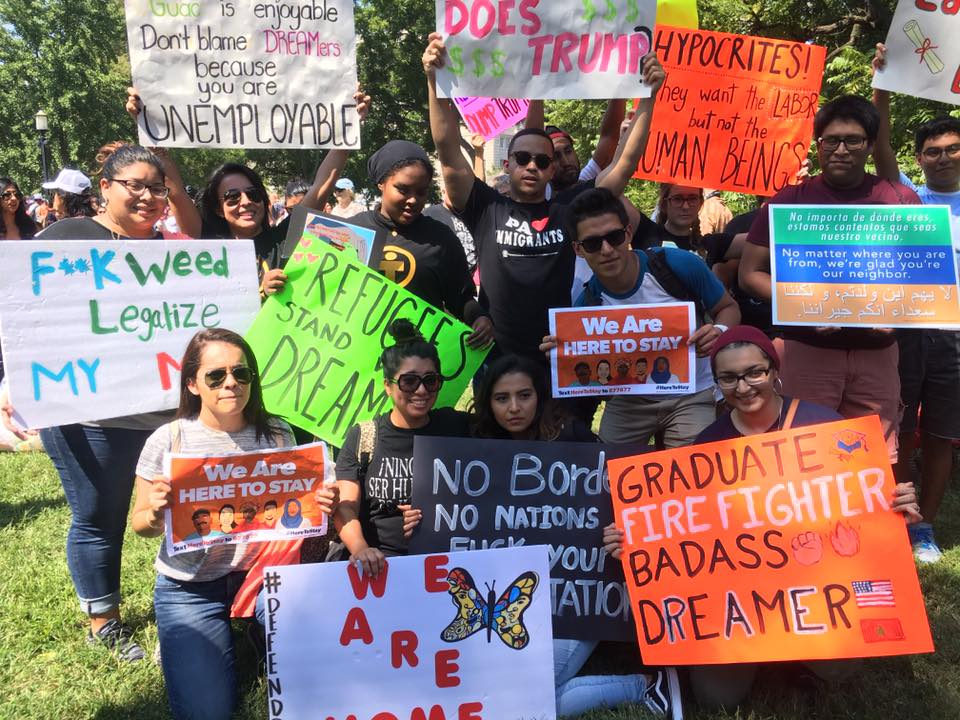
“This clandestine war of denial would thus be waged in the shadows, in that twilight space of what is called mourning.”
Jacques Derrida, “By Force of Mourning”
For the past week, leading up to yesterday’s announcement concerning what many predicted would be the closure of the Deferred Action for Childhood Arrivals and then after the fateful announcement, the language of the day has been “living in the shadows.” DACA recipient after DACA recipient has explained what living in the shadows meant and what it will mean. Today, an “immigration hardliner” Congressman explained that forcing people back into the shadows is justice: “They continue to live the objective that they sought to achieve when they illegally entered America. Live in the shadows. Live in the shadows and if you get crossways with the law, then the law requires they be placed in criminal proceedings and go home. I think there’s justice there, but we need to provide justice.” We need to provide justice.
DACA recipient and Rhode Island resident Rodrigo Pimentel explains, “Living in the shadows means declining legitimate job offers, as I would be unable to work lawfully. Undocumented people that work “off the books” risk employer exploitation such as wage theft. My father was a victim of this when he first came to the US: he found a job in Maryland soon after arrival, but after two weeks of work, he was laid off without pay and no legal recourse. Like many undocumented people, I fear that I may have to move from job to job, without a sense of knowing where I will be working next week or even whether I will be paid.”
Ivy Teng Lei adds, “`Living in the shadows’ is a very accurate way of describing our way of life. We never caused trouble, never asked for more than what we were given, and were perpetually afraid to attract anyone’s attention.”
We will not go back to living in the shadows. We are here to stay, in the light and as part of the sunlit world.
In The Republic, Plato provides the parable, or allegory or myth, of the cave, in which prisoners are chained and bound from birth and can only look forward. They see reflections of a fire behind them, they hear the voices of men carrying objects, whose shadows they see, and they believe, they know, the shadows are real people. Then one prisoner is yanked into freedom. When he looks at the fire, he is temporarily blinded but continues out of the cave into the sunlight and sunlit world. Being a person of compassion, the prisoner returns to the cave to free his fellow prisoners. As he returns, he is again blinded, this time by the darkness of the cave. When he reports the wonders of the sunlit world, the perpetual prisoners mock him, blind man that he is. If they could, they would murder him. This is the foundational parable of living in the shadows.
Here is today’s version of that parable: The President, who says he has “great love” for DACA recipients, hides in his own shadows while his Attorney General uses bald-faced racist, xenophobic, White Nationalist lies in order to demonstrate that his vicious act of cruelty is actually a commission of compassion. Their supporters applaud and explain that forcing the young to live in the shadows is justice. The real crime of those threatened with being forced to live in the shadows is that they are human, all too human, and that they have seen the light and the sunlit world. Their crime is their humanity. For the others, the ones who impose and enforce the State of Shadows, their crime is murder, murder of the soul, murder of the dream. They do not know that, while living in the shadows is impossibly hard, mistaking human beings for shadows is a crime against humanity. The work of mourning must wait until we finish the work of justice and freedom.

(Photo Credit 1: Al Jazeera) (Photo Credit 2: Facebook / Sammie Moshenberg)